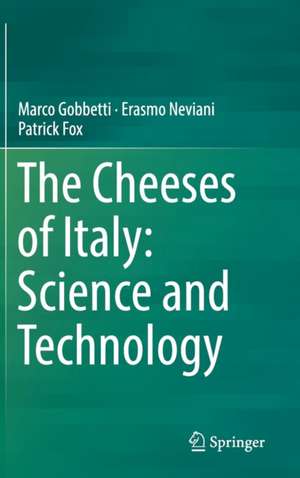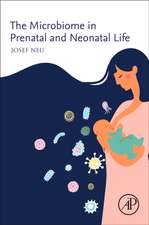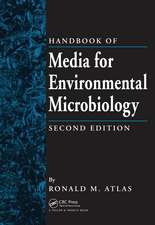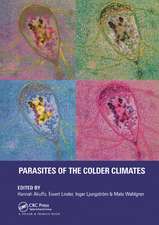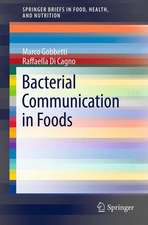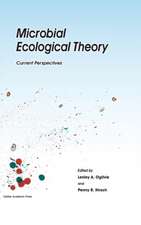The Cheeses of Italy: Science and Technology
Autor Marco Gobbetti, Erasmo Neviani, Patrick Foxen Limba Engleză Hardback – 5 iun 2018
| Toate formatele și edițiile | Preț | Express |
|---|---|---|
| Paperback (1) | 527.15 lei 6-8 săpt. | |
| Springer International Publishing – 21 dec 2018 | 527.15 lei 6-8 săpt. | |
| Hardback (1) | 702.73 lei 6-8 săpt. | |
| Springer International Publishing – 5 iun 2018 | 702.73 lei 6-8 săpt. |
Preț: 702.73 lei
Preț vechi: 826.75 lei
-15% Nou
Puncte Express: 1054
Preț estimativ în valută:
134.47€ • 140.68$ • 111.70£
134.47€ • 140.68$ • 111.70£
Carte tipărită la comandă
Livrare economică 02-16 aprilie
Preluare comenzi: 021 569.72.76
Specificații
ISBN-13: 9783319898537
ISBN-10: 3319898531
Pagini: 194
Ilustrații: XIV, 274 p. 220 illus., 209 illus. in color.
Dimensiuni: 155 x 235 mm
Greutate: 0.58 kg
Ediția:1st ed. 2018
Editura: Springer International Publishing
Colecția Springer
Locul publicării:Cham, Switzerland
ISBN-10: 3319898531
Pagini: 194
Ilustrații: XIV, 274 p. 220 illus., 209 illus. in color.
Dimensiuni: 155 x 235 mm
Greutate: 0.58 kg
Ediția:1st ed. 2018
Editura: Springer International Publishing
Colecția Springer
Locul publicării:Cham, Switzerland
Cuprins
Chapter 1: The orgins of cheesemaking.- Chapter 2: The history and culture of Italian cheeses in the middle age.- Chapter 3: Cheese: an overview.- Chapter 4: Classification of cheese.- Chapter 5: The distinguishing features of Italian cheese manufacture.- Chapter 6: The most traditional and popular Italian cheeses.
Notă biografică
Marco Gobbetti is a full professor of food microbiology since 2000. Currently, he is working at the Free University of Bolzano, Bolzano, Italy. His research, teaching, and outreach focus on food fermentations and lactic acid bacteria physiology and biochemistry. He has published articles and books on several fermented foods, using lactic acid bacteria as starters for the food manufactures, and on driving complex food ecosystems through the application of omics technologies. To date, he is author of more than 300 per reviewed articles, having an “h” index of 60 with more than 12,000 citations. He is the member of the editorial board of various international journals. He has a number of representative roles at national and international levels dealing with biotechnology and life sciences.Erasmo Neviani is full professor of Agricultural Microbiology since 2002 at the Food and Drug Department of the University of Parma. Formerly, he has been Dean of Faculty of Agriculture– University of Parma (2009-2012), Head of Microbiology and Enzymology Department of Dairy Research Institute (Lodi, Italy) of Italian Ministry of Agriculture (1996-2002) and President of SIMTREA – Italian Society of Agricultural, Food and Environment (2013-2015).
His main research areas concern Food Microbiology with a specific expertise in Dairy microbiology. The main part of his research work was dedicated to the study of lactic acid bacteria used in Dairy fermentations, with particular regard to their technological performances. His research activity can be resumed as follows: [i] Microbiology and technology of dairy products; [ii] Molecular microbiology and biotechnology of lactic acid bacteria [iii] population dynamics and behavior of lactic acid bacteria in food fermentation; [iv] microbial interactions in natural food ecosystems; [v] microbial enzymatic activities and cheese ripening; [vi] food safety and processing; and [vii] human intestinal microbiome in response todietary habits, diseases and food intolerance. He has authored about 300 publications that relate to the microbiology of dairy food, most of them (ca. 150) in international journals.
He is author of the book “MICROBIOLOGIA E TECNOLOGIA LATTIERO-CASEARIA, Qualità e sicurezza” 2006, Ed Tecniche Nuove (Milano) ISBN 8848118178”. He is co-editor of a international book: Randazzo C. L., Caggia C., Neviani E. (2013): Cheese Ripening: Quality, Safety and Health Aspects. Nova Science Publishers. Hauppauge NY, USA. ISBN – 978-1-62417- He also published different chapters on International and National Books.Patrick F. Fox is Emeritus Professor of Food Chemistry at University College, Cork, Ireland. His teaching and research interests are on various aspects of Dairy Chemistry, especially , the production and ripening of cheese, heat stability of milk, physico-chemical properties of milk proteins and dairy enzymology. He is the author or co-other of about 600 peer-reviewed publications, author or editor of about 30 books on Dairy Chemistry and one of the founding editors of the International Dairy Journal in 1990.
His main research areas concern Food Microbiology with a specific expertise in Dairy microbiology. The main part of his research work was dedicated to the study of lactic acid bacteria used in Dairy fermentations, with particular regard to their technological performances. His research activity can be resumed as follows: [i] Microbiology and technology of dairy products; [ii] Molecular microbiology and biotechnology of lactic acid bacteria [iii] population dynamics and behavior of lactic acid bacteria in food fermentation; [iv] microbial interactions in natural food ecosystems; [v] microbial enzymatic activities and cheese ripening; [vi] food safety and processing; and [vii] human intestinal microbiome in response todietary habits, diseases and food intolerance. He has authored about 300 publications that relate to the microbiology of dairy food, most of them (ca. 150) in international journals.
He is author of the book “MICROBIOLOGIA E TECNOLOGIA LATTIERO-CASEARIA, Qualità e sicurezza” 2006, Ed Tecniche Nuove (Milano) ISBN 8848118178”. He is co-editor of a international book: Randazzo C. L., Caggia C., Neviani E. (2013): Cheese Ripening: Quality, Safety and Health Aspects. Nova Science Publishers. Hauppauge NY, USA. ISBN – 978-1-62417- He also published different chapters on International and National Books.Patrick F. Fox is Emeritus Professor of Food Chemistry at University College, Cork, Ireland. His teaching and research interests are on various aspects of Dairy Chemistry, especially , the production and ripening of cheese, heat stability of milk, physico-chemical properties of milk proteins and dairy enzymology. He is the author or co-other of about 600 peer-reviewed publications, author or editor of about 30 books on Dairy Chemistry and one of the founding editors of the International Dairy Journal in 1990.
Textul de pe ultima copertă
This book contains a detailed description of the historical aspects of cheese manufacture, historical information on the most traditional and popular Italian cheese varieties. An overview of cheese production is included, covering the main general aspects. An overall classification of Italian cheeses follows, which categorizes all the cheese varieties that have a tradition and/or an economic importance. Based on a large literature review, the core of the book includes descriptions of cheese- making traits which are unique to Italian cheeses. In particular, the chemical composition of milk, the use whey or milk natural starters, some technology options (e.g., curd cooking), the microbiota composition and metabolism during curd ripening, especially for cheese made from raw milk, and the main relevant biochemical events, which occur during the very long-time ripening, are described. The last part of the book provides a detailed description of the biotechnology for the manufacture of the most traditional and popular Italian cheeses.
Caracteristici
First scientific book on cheese to solely focus on Italian cheese Written by experts in cheese and dairy Will appeal to professionals in the industry as well as students
